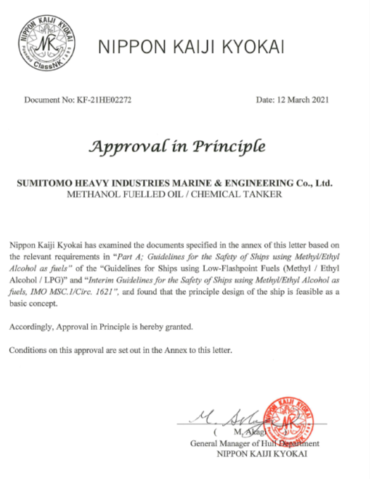Sumitomo Heavy Industries has been Granted an “Approval in Principle” for a Methanol Dual-Fueled Tanker
March 22, 2021
On March 12, 2021, Sumitomo Heavy Industries Marine & Engineering Co., Ltd. (President: Hideshi Shimamoto; a wholly-owned subsidiary of Sumitomo Heavy Industries, Ltd.) was granted an “Approval in Principle” (AiP) from Nippon Kaiji Kyokai (ClassNK) for a tanker equipped with a methanol dual-fuel system.
Methanol is recognized as one of the superior clean fuel because it does not exhaust sulfur oxide (SOx) at all, and it can also reduce abt. 8% of greenhouse gas emission compared with current heavy fuel oil. And as difference between gas fuel such as LNG and hydrogen, methanol is liquid and easy to handle. Furthermore, it has the potential to achieve “zero emission” when it is produced by promising CO2 recycling process. In detail design, regarding methanol fuel, due consideration is required to properly reduce potential risk of fire and leakage by its low flash point and toxic. Our tanker is carefully designed to install a main engine and methanol fuel supply system such as fuel pump, fuel tank and fuel control system which enable to use both methanol fuel and fuel oil. Our tanker also uses double walled fuel oil piping, a leak detection system, etc. to ensure higher safety against leakage and fire. For such highly reliable tanker design, we have been granted the AiP from ClassNK.
The shipping industry is making efforts to reduce greenhouse gas emission and expecting environmentally friendly vessels. Our tanker’s Energy Efficiency Design Index (EEDI), which is an index for amount of greenhouse gas emission from the vessel, is far below the phase 3 of 2025 criteria, this can prove our tanker’s much higher performance in the emission reduction.
We will continue to provide customers with ecologically friendly vessel that can significantly reduce the emission of greenhouse gas and all environmental loads by our technology, and to meet the needs of society and contribute to development of sustainable shipping industry.

